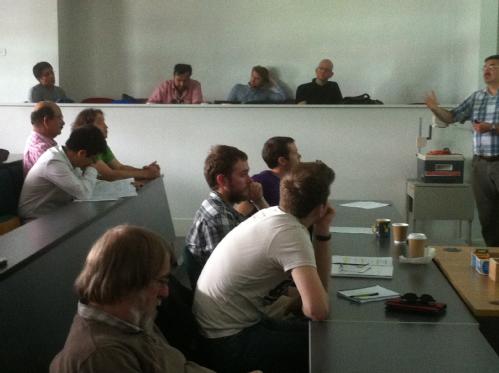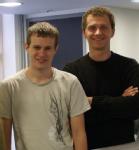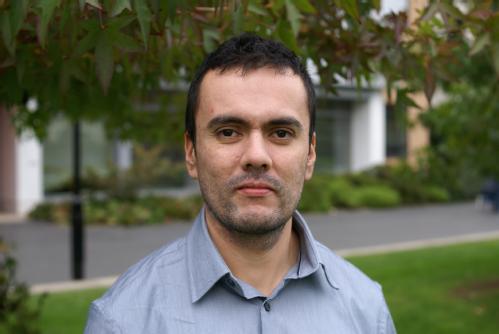Computer Science News
Warwick and King’s College London to establish London-based Centre for Urban Science and Progress
Warwick and King’s College London, in partnership with New York University, plan a major initiative in collaboration with the GLA and the London Borough of Southwark to launch 'CUSP London', a branch of NYU’s Center for Urban Science and Progress, to be based at Canada Water from 2018. The announcement was made on Monday 17 June 2014 by Boris Johnson, Mayor of London, at an event organised by Bloomberg to mark the start of London Technology Week.
London will be the first city to build upon the success of CUSP in New York, which was launched in April 2012 by Mayor Bloomberg and of which Warwick is an academic partner. In developing CUSP London, the partners will benefit from the experience in New York City, where CUSP is now established as a leader in the new field of urban science and informatics.
Professor Nigel Thrift, Vice-Chancellor of Warwick commented: "I welcome the launch of CUSP London, both as a researcher of the dynamics of cities, and as Vice-Chancellor of Warwick which is a partner both in the CUSP London initiative and the original CUSP in New York. CUSP London will be a significant engine of applied urban science research, innovation and education that will work with London as a living laboratory applying research to the needs of our capital and to other great cities."
CUSP London will bring together researchers, businesses, local authorities and government agencies to apply urban science to improving public health and wellbeing. It will draw on the real experience and ‘big data’ available in cities, thereby using the cities themselves as living laboratories to tackle their most significant issues. CUSP London will complement the MedCity initiative which the GLA recently launched with King’s and other academic partners, and the Mayor of London’s Smart London plan.
Experts at CUSP London will use data to develop deeper understanding and practical solutions to a wide range of challenges affecting people’s everyday lives. The international partnership will also train a new generation of postgraduate and PhD level urban scientists with the skills and knowledge to benefit London and other major UK and global cities.
Professor Sir Richard Trainor KBE, Principal of King’s, commented: "If we are to tackle the increasingly complex challenges facing London and other cities, we need initiatives like CUSP London. It will train a new generation of urban scientists, and harness expertise, research insights and big data from across the public and private sectors in order to enhance health and efficiency in increasingly populated and fast changing cities."
It is anticipated that CUSP London would generate around 180 construction jobs for two years, and once fully operational, to accommodate around 100 researchers and 500 students. CUSP London will seek development funding from public, industry and philanthropic sources.
Steve Koonin, Director of New York University’s Center for Urban Science and Progress, said: "We are delighted to welcome London to the CUSP family. We are honored by their strong support of our work and the steps taken to build on our successes in New York City. Our New York team stands ready to work with Kings College and the University of Warwick as the CUSP model is expanded abroad."
DIMAP Algorithms Day 2014

On May 21 2014, our Division of Theory and Foundations, jointly with DIMAP, organized DIMAP Algorithms Day 2014. The goal of the event was to bring together the UK community of researchers and graduate students interested in the study of Algorithms, Data Structures, and Complexity.
The event had an outstanding list of invited speakers from the leading academic institutions and research labs (Alexandr Andoni (Microsoft Research Silicon Valley), Graham Cormode (Warwick), Edith Elkind (Oxford), Leszek Gąsieniec (Liverpool), Aleksander Mądry (EPFL)) presenting the recent advances in Algorithms and its applications, and attracted over 60 participants from over the UK and from abroad.
IT firms hope to benefit from big data research with Warwick University partnership

As reported in 'Computer Business Review' and 'Computer World' (14/5/2014)
A new partnership between the University of Warwick and Bull Information Systems has been announced supporting IT developments in Big Data. The new partnership will allow leading research scientists from the university to work alongside business consultants and developers from one of Europe’s foremost suppliers of computing hardware, software and consulting services.
“So much has been discussed about the possibilities of big data yet few businesses have the advanced expertise needed to go beyond this,” said Andrew Carr, CEO of Bull UK and Ireland.
“They may already have a vision but be unsure about how to get there - or they may not even be aware of what they could achieve with the data they hold and need help to identify the opportunities.
“By taking this challenge beyond the mainstream business environment and engaging the best brains possible on the subject, we can help organisations start to realise big data implementations by injecting a new dynamism into high performance project development that will enable them to be the first to market with their initiatives.”
Professor Stephen Jarvis, who is leading the partnership at Warwick, stated that "Bull is committed to open standards and 'open ICT solutions' which allows users, including ourselves, to gain real insight and expertise in developing data analytics infrastructures as well as developing skills in using that infrastructure.”
“Organisations are bombarded by data in diverse forms from social media to connected sensors, but few know how to combine structured and unstructured forms and convert data to information to give real value. We aim to help them overcome these barriers and to develop great commercial applications that will significantly improve the experience of their customers.”
How to tell if a tweet is telling the truth
How to tell if a tweet is telling the truth, The Times, Pages 1-2, 19 February, 2014.
Information we find through social media cannot always be trusted. A study of social media during the Boston bombing of 2013 concluded that 29% of the most viral content were rumours. This is clearly a major problem and, given the volume – Twitter users send 500 million tweets per day – requires the use of automated techniques to solve it. Research has already identified a number of tell-tale features in the digital ‘signatures’ of social media postings and the sources that produce them that are correlated with trustworthiness. These include posting history and connections with other social media users. The Pheme project, a new £3.5M European Union funded research project involving Computer Scientists from the University of Warwick, will build on this research and will also develop ways to analyse topics in postings, their consistency with other sources and distinguish the different ways in which social media users respond to them.
By combining these different approaches, Pheme will create computer tools with improved ability to discriminate between trustworthy and untrustworthy sources and with the capacity to process the large volumes of information circulating in social media daily. These tools will be made widely available for news media, government agencies and community organisations to use. By providing the means to amplify natural self-correction mechanisms in human communication, Pheme will help people to be more confident in assessing the veracity of information they find in social media.
See: http://www.thetimes.co.uk/tto/technology/internet/article4009691.ece
Rob Procter is Professor of Social Informatics in the Department of Computer Science, University of Warwick. He led a multidisciplinary team to work with the Guardian/LSE on the ‘Reading the Riots’ project, analysing tweets sent during the August 2011 riots. This work won the Data Visualization and Storytelling – National/International category of the inaugural Data Journalism Awards sponsored by Google, the 2012 Online Media Award for the ‘Best use of Social Media’. He is a founder member of the Collaborative Online Social Media Observatory (Cosmos), a multidisciplinary group of researchers in England, Scotland and Wales that is building a platform for social media analytics.
EPSRC Funding for new Centre for Urban Science

The EPSRC has recently announced funding for a new Centre for Doctoral Training (CDT) in Urban Science, which will train scientists to harvest and process big data in order to develop a better understanding of the science of cities, and to apply that knowledge to find smart solutions to urban problems.
In just a few decades the world's population will exceed 9 billion, 70% of whom will live in cities. Enabling those cities to deliver services effectively, efficiently and sustainably, while keeping their citizens safe, healthy, prosperous and well informed, will be among the most important undertakings of this century” [UN Habitat].
This new CDT is led by Computer Science at Warwick, and involves partnership with the cities of New York and Birmingham. Several industry partners are backing the centre, including IBM, URS, AT&T, Cisco, E.ON and British Gas. The centre will support over 50 new PhD students over the next 5 years and each student will have the opportunity to work as part of a larger cohort, involving students from Carnegie Mellon University, New York University, University of Toronto and IIT Mumbai.
The CDT will provide EPSRC-funded PhD students with an unprecedented opportunity to work with industry experts and alongside our city officials on real-world urban science problems. Seldom have so many international academic institutions, leading businesses and city agencies been focused on one activity; seldom has the opportunity arisen to develop scientific solutions that will have direct impact on billions of the world’s population.” [Deputy Mayor New York City]
For more information about the centre, or enquiries about PhD opportunities, please contact Prof Stephen Jarvis.
Dr Victor Sanchez awarded Marie Curie Grant
Dr Victor Sanchez, Assistant Professor in the Department of Computer Science, has been awarded a Marie Curie Career Integration Grant from the Research Executive Agency of the EU to fund his research for the next four years. The Integration Grants assist researchers in integrating themselves in the EU with their own research budget. For the first call of 2013, more than 800 proposals from around the EU were submitted of which 22% received funding. Dr Sanchez research will focus on developing methods for storing and manipulating whole-slide images of pathology specimens, which are multi-gigapixel colour images of over 80k × 80k pixel resolutions. He will work in collaboration with the Computational Biology and Bioimaging (COMBI) group, and researchers from Universitat Autonoma de Barcelona and University of Arizona.
Best paper at ICALP 2013 (Track B) for John Fearnley and Marcin Jurdzinski

Congratulations to our staff member Dr Marcin Jurdziński, for winning the best paper award at the main European conference in Theoretical Computer Science ICALP 2013 (Track B), for the paper Reachability in Two-Clock Timed Automata is PSPACE-complete he co-authored with Dr John Fearnley (a Warwick PhD, currently at the University of Liverpool).
he co-authored with Dr John Fearnley (a Warwick PhD, currently at the University of Liverpool).
John and Marcin's paper is one of six Warwick papers accepted for presentation at ICALP. Moreover, two of the 2007 Warwick BSc Computer Science graduates have papers at ICALP 2013 (John Fearnley and Dominic Orchard). Congratulations are in place for all Warwick authors at ICALP!

